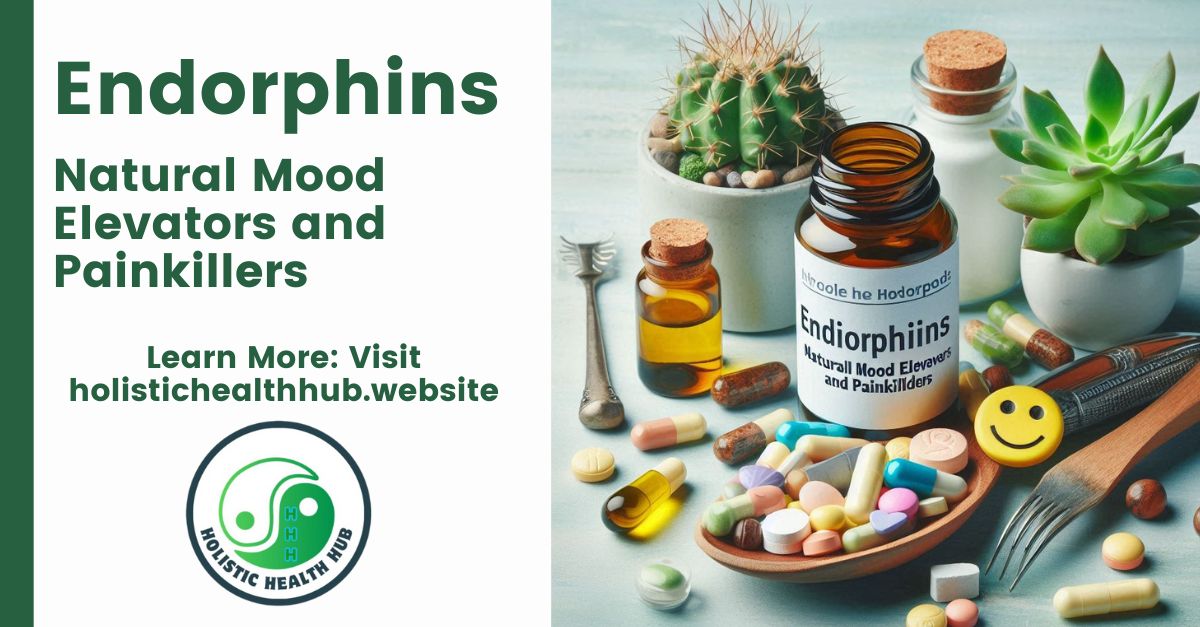Endorphins, often referred to as the body’s natural painkillers, play a crucial role in elevating mood and creating a sense of euphoria. These neurochemicals are released during physical activities, laughter, and other enjoyable experiences. In this comprehensive guide, we’ll explore how endorphins influence our well-being, their benefits, and ways to boost their production.
1. Understanding Endorphins
What Are Endorphins? Endorphins are neuropeptides produced by the central nervous system and the pituitary gland. They act on the opiate receptors in our brains to reduce pain and boost pleasure, resulting in a feeling of well-being.
How Endorphins Work: When endorphins are released, they bind to receptors in the brain that reduce pain perception and trigger positive feelings. This natural process is akin to the action of pain-relief medications, but without the side effects.
2. Endorphins and Physical Activity
Exercise-Induced Euphoria: Physical activities, especially aerobic exercises like running, swimming, or cycling, stimulate the release of endorphins. This phenomenon, often termed the “runner’s high,” leads to an elevated mood and reduced pain.
Strength Training: Engaging in weightlifting or resistance training also prompts the production of endorphins, contributing to the overall feeling of satisfaction post-workout.
Group Sports: Participating in team sports combines physical exertion with social interaction, further amplifying endorphin release and enhancing mood.
3. Endorphins and Laughter
The Power of Laughter: Laughter is a potent stimulus for endorphin release. Shared laughter, such as watching a comedy with friends or enjoying a funny conversation, boosts endorphin levels and strengthens social bonds.
Humor Therapy: Incorporating humor and laughter into daily life can serve as an effective strategy for managing stress and improving emotional health. Activities like watching stand-up comedy or engaging in playful activities can elevate mood by triggering endorphin production.
4. Endorphins and Enjoyable Experiences
Creative Activities: Engaging in creative pursuits such as painting, playing music, or crafting can lead to a flow state, during which endorphin levels rise. This state of immersion not only enhances creativity but also promotes feelings of happiness.
Eating Spicy Foods: Consuming spicy foods can stimulate the release of endorphins. Capsaicin, the compound responsible for the heat in chili peppers, binds to pain receptors, leading to an endorphin rush as the body attempts to neutralize the burning sensation.
Social Interactions: Positive social interactions, such as spending quality time with loved ones, participating in social events, or volunteering, can increase endorphin levels. These interactions foster a sense of connection and well-being.
5. Endorphins and Stress Management
Stress Reduction: Endorphins play a crucial role in managing stress. By reducing pain perception and promoting positive emotions, endorphins help buffer the negative effects of stress on the body and mind.
Relaxation Techniques: Practices like meditation, yoga, and deep-breathing exercises can stimulate endorphin production. These activities promote relaxation and enhance emotional resilience.
6. Long-term Benefits of Elevated Endorphin Levels
Emotional Well-being: Sustained high levels of endorphins contribute to overall emotional health. Regularly engaging in activities that boost endorphins can lead to long-term improvements in mood and reduced feelings of anxiety and depression.
Pain Management: For individuals dealing with chronic pain conditions, enhancing endorphin levels through exercise, laughter, and other enjoyable activities can provide natural pain relief and improve quality of life.
Can endorphin levels be influenced by diet and nutrition
Yes, endorphin levels can indeed be influenced by diet and nutrition. While endorphins are primarily released through physical activities, laughter, and pleasurable experiences, certain dietary choices can also support their production and overall mood enhancement. Here’s a detailed look at how diet and nutrition can influence endorphin levels:
1. Tryptophan-Rich Foods
Endorphins are often associated with the neurotransmitter serotonin, which is synthesized from the amino acid tryptophan. Consuming foods rich in tryptophan can help boost serotonin levels, indirectly influencing endorphin release. Key tryptophan-rich foods include:
- Salmon: High in omega-3 fatty acids and tryptophan, salmon supports brain health.
- Turkey: Known for its high tryptophan content, turkey can promote relaxation and improve mood.
- Eggs: A good source of protein and tryptophan, eggs can enhance serotonin production.
- Nuts and Seeds: Almonds, walnuts, and pumpkin seeds are beneficial for their healthy fats and tryptophan content.
- Dairy Products: Milk and cheese provide both calcium and tryptophan, supporting overall health.
- Soy Products: Tofu and soy milk are excellent vegetarian sources of tryptophan.
2. Carbohydrates
Pairing tryptophan-rich foods with healthy carbohydrates (like whole grains) can enhance the absorption of tryptophan into the brain. Carbohydrates stimulate insulin production, which helps clear competing amino acids from the bloodstream, allowing more tryptophan to enter the brain and subsequently boosting serotonin levels.
3. Spicy Foods
Consuming spicy foods can stimulate the release of endorphins. Capsaicin, the compound responsible for the heat in chili peppers, binds to pain receptors in the mouth, leading to an endorphin rush as the body attempts to neutralize the burning sensation.
4. Probiotics and Gut Health
A healthy gut microbiome is linked to serotonin production since a significant amount of serotonin is produced in the gut. Incorporating probiotic-rich foods like yogurt, kefir, sauerkraut, and kombucha into your diet can support gut health and potentially enhance endorphin levels indirectly.
5. Hydration
Staying hydrated is essential for overall bodily functions, including neurotransmitter synthesis. Dehydration can negatively impact mood and cognitive function. Drinking enough water throughout the day supports optimal brain function and may help maintain balanced endorphin levels.
6. Omega-3 Fatty Acids
Omega-3 fatty acids found in fatty fish (like salmon), flaxseeds, chia seeds, and walnuts have been shown to support brain health and may help improve mood by influencing neurotransmitter function.
Diet and nutrition play a significant role in influencing endorphin levels through various mechanisms, primarily by providing essential nutrients that support serotonin production. Incorporating a balanced diet rich in tryptophan-containing foods, healthy carbohydrates, probiotics, spicy foods, hydration, and omega-3 fatty acids can enhance mood and promote overall well-being. By making mindful dietary choices alongside other lifestyle practices such as exercise and mindfulness techniques, individuals can effectively boost their endorphin levels naturally. If you have specific dietary concerns or conditions affecting your mental health, consulting with a healthcare professional or nutritionist may provide personalized guidance tailored to your needs.
How can you incorporate more endorphin-boosting activities into your daily routine
Incorporating endorphin-boosting activities into your daily routine can significantly enhance your mood and overall well-being. Here’s a comprehensive guide on how to effectively integrate these activities into your life:
1. Regular Physical Activity
Aerobic Exercise: Aim for at least 30 minutes of moderate aerobic exercise most days of the week. Activities such as:
- Running or Jogging: Great for cardiovascular health and known for inducing the “runner’s high.”
- Cycling: Whether stationary or outdoor cycling, it’s an excellent way to elevate your heart rate.
- Swimming: A low-impact exercise that is enjoyable and effective in boosting endorphins.
- Brisk Walking: Simple yet effective, especially when done outdoors.
Strength Training: Include strength training exercises at least twice a week:
- Weight Lifting: Use free weights or machines to build strength.
- Bodyweight Exercises: Incorporate push-ups, squats, and lunges into your routine.
2. Engage in Laughter
Humor Therapy: Make time for activities that make you laugh:
- Watch Comedies: Enjoy a funny movie or stand-up comedy show.
- Share Jokes with Friends: Engage in playful conversations that promote laughter.
3. Explore Creative Activities
Engage in creative pursuits that bring you joy:
- Art and Crafting: Painting, drawing, or crafting can lead to a flow state that enhances endorphin levels.
- Playing Music: Whether you play an instrument or sing, music can be a powerful mood booster.
4. Social Interactions
Foster positive social connections:
- Spend Time with Loved Ones: Schedule regular catch-ups with friends and family.
- Volunteer: Participate in community service or group activities that foster social bonds.
5. Mindfulness Practices
Incorporate mindfulness techniques into your daily routine:
- Yoga: Practice yoga several times a week to combine physical movement with relaxation techniques.
- Meditation: Dedicate time each day for mindfulness meditation to reduce stress and enhance emotional well-being.
6. Outdoor Activities
Take advantage of nature to boost your mood:
- Hiking: Explore local trails and enjoy the beauty of nature while engaging in physical activity.
- Gardening: Spend time tending to plants, which can be both relaxing and rewarding.
7. Nutrition Focus
Incorporate foods that promote endorphin production:
- Tryptophan-Rich Foods: Include salmon, turkey, eggs, nuts, seeds, and dairy products in your diet.
- Spicy Foods: Add chili peppers to meals to stimulate endorphin release.
8. Quality Sleep
Prioritize good sleep hygiene:
- Establish a regular sleep schedule and create a calming bedtime routine to ensure adequate rest.
9. Massage Therapy
Consider regular massage sessions:
- Schedule professional massages or practice self-massage techniques at home to reduce stress and enhance relaxation.
By incorporating these endorphin-boosting activities into your daily routine—such as regular exercise, laughter, creative pursuits, social interactions, mindfulness practices, outdoor activities, nutritional choices, quality sleep, and massage therapy—you can significantly enhance your mood and overall well-being. Start small by choosing a few activities that resonate with you and gradually build them into your routine for optimal benefits. Consistency is key; the more regularly you engage in these activities, the greater the potential for boosting endorphin levels and improving your emotional health.
Conclusion: Endorphins
Endorphins are powerful natural chemicals that not only alleviate pain but also elevate mood and create a sense of euphoria. By understanding how endorphins work and incorporating activities that boost their production—such as physical exercise, laughter, creative pursuits, and positive social interactions—we can enhance our emotional well-being and manage stress more effectively. Embracing a lifestyle that fosters endorphin release can lead to long-term benefits, promoting overall health and happiness.
Oxytocin: How Social Connection Influences the Love Hormone Levels
Boost Serotonin: Your Brain’s ‘Feel-Good’ Chemical Naturally
Boost Your Mood: The Science of Happiness


